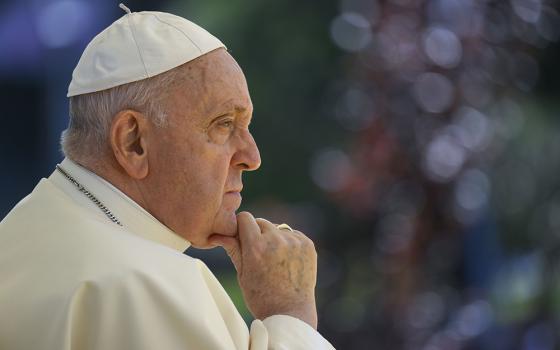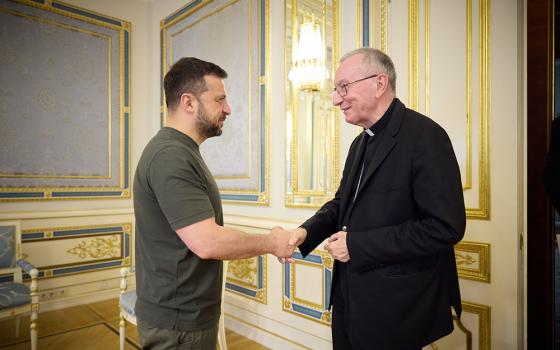I think we can call use some good news about the Church, after a rough couple of weeks from the assessment of the LCWR to Bishop Jenky’s histrionic comparisons to the dark canonical warnings coming from Madison. Well, it is not really “news” but it is very good. I want to take a moment to look at the state of Catholic higher education at this moment in our history.
In 1955, my mentor Monsignor John Tracy Ellis delivered what would become his most famous lecture: “American Catholics and the Intellectual Life.” The lecture was subsequently adapted into a book the following year. Ellis did not mince words in asserting that catholic intellectual institutions failed to meet the commonly achieved standards of their secular peers, and that few Catholic intellectuals could match the contributions being made by non-Catholics to the nation’s intellectual life. Obviously, this book never made it on to the reading list of Mr. Douthat whose recent book holds up the 1950s as a kind of Golden Age of Christian orthodoxy and cultural influence. Ellis was, of course, aware of the impoverished immigrant backgrounds of many Catholics, and of the extant anti-Catholic prejudices of the nation. But, the principal reason for the intellectual shortcomings, Ellis asserted, was that Catholics themselves suffered from a “frequently self-imposed ghetto mentality which prevents them from mingling as they should with their non-Catholic colleagues, and in their lack of industry and habits of work.” Ouch.
There is an echo of Ellis’ sentiment in the book I reviewed yesterday, Brad Gregory’s “The Unintended Reformation,” which also notes the ways that Catholic intellectual isolation proved to be a disservice to the Church. He distinguishes between the undeniable achievements of certain twentieth century philosophers and theologians who, in different ways, were inspired by the works of Aquinas and what he calls “the ways in which neo-Thomism was institutionalized in Catholic higher education following Leo XIII’s call for the revival of Aquinas in Aeterni Patris (1879). The institutionalization…down-played knowledge-making in other disciplines and kept research in them at a distance from the Aristotelian and Thomistic philosophical categories that underpinned that theology. This distancing was reinforced by papal encyclicals such as Pascendi Dominici Gregis (1907) and Humani Generis (1950), which, as a symptomatic reflection of Catholic theology’s long-standing insulation from the wider world of knowledge-making, blithely lumped together many-stranded and complex intellectual issues under conflationary labels such as ‘Modernism.’”
So, you might say that Catholic intellectuals have come late to the table. You might also say, if you were feeling churlish and looking at the intellectual detritus of the last couple of centuries, maybe missing the first course of modernity was not such a bad thing and that it appears every one else is still suffering from intellectual food poisoning! But, churlishness is not an intellectual stance of much profit and it is not to be commended to Christians who are called, quite explicitly to always be ready to give an account of the hope that is within us.
No, what is striking about Ellis’ and Gregory’s is not simply the veracity they announce. It is that their subsequent work helps to undermine the danger they have highlighted. Msgr. Ellis has gone to God, but his contributions to Catholic intellectual life continue in the lives of the students he taught. Gregory has produced a work of very serious scholarship. A few weeks ago, I reviewed another work by a Notre Dame scholar, Timothy Matovina’s splendid analysis Latino Catholicism in the U.S. for The New Republic. On my list of other books to be read this summer by Notre Dame scholars are Nicole Garnett's "Ordering the City" and Dan Philpott's “God's Century.” NCR recently reviewed Nick Cafardi’s book “Voting and Holiness” which includes a noteworthy chapter by Notre Dame’s M. Cathleen Kaveny. Notre Dame was the object of much criticism, its Catholic identity challenged even, when it invited President Barack Obama to give the commencement address in 2009. But, what is obvious from these scholarly books is that the Catholic identity of Notre Dame is not in doubt and, furthermore, it is enormously, encouragingly fecund. Those at the Cardinal Newman Society who fret about who is invited to speak on Catholic campuses could better use their time celebrating the achievements of Catholic scholarship and engaging their work. They might discover that an openness to the world is part of the secret.
As regular readers know, I am a visiting fellow at Catholic University’s Institute for Policy Research & Catholic Studies. This has given me the great opportunity to interact with scholars who, like their colleagues at Notre Dame, are doing important work, work that would have been inconceivable if the intellectual life of the Church was still living under the cloud of accusations of Modernism. In “Voting and Holiness,” Stephen Schneck has a chapter on President Kennedy’s speech before the Houston Ministerial Association which, if Mr. Santorum had read it, he might not have felt the urge to throw up. Professor William Dinges’ analysis of social science data regarding the different reasons given for leaving the Church before and after Vatican II is research that not only adds to our knowledge of the sociology of religion, but which has obvious pastoral implications of great significance. So, too, William D’Antonio’s surveys of Catholic attitudes over the years and Father Anthony Pogorelc’s efforts to gauge the attitudes of Catholic Millennials today.
Catholic intellectual life is showing signs of great robustness. Precisely because our intellectual traditions pre-date modernity, they can more easily find solid ground from which to critique modernity, and not just critique, but get to the root of the matter, the ways that modernity’s basic philosophic anthropology has proven to been an unsure foundation upon which to build, leaving the undeniable achievements of modernity in a very precarious position, unable to defend themselves from the internal contradictions of their premises.
I have not been shy about indicating my distaste for much recent Catholic theology. It seems to me that in the post-Vatican II era, too many theologians took the conciliar mandate to “discern the signs of the times” as a warrant to embrace the signs of the times, often quite uncritically. The academic life of the United States has been beset by a certain faddishness in recent decades, and too many Catholic thinkers have been all too willing to drink as deeply as one can at such shallow wells. Sticking with watery metaphors, it is also the case that too many conservative thinkers decry the post-Vatican II flood of foolishness, without thinking that perhaps those who built the pre-Vatican II dam separating Catholics from the culture should be a bit shy about condemning those who opened the floodgates without also acknowledging that perhaps the dam should never have been built in the first place. Again, Douthat is Exhibit A in this regard if only because he is the most recent advocate of this particular nostalgia for a celebrated 50’s Catholicism about which there was less to celebrate than he might imagine.
Many students will take their last finals today. Those students at Catholic universities and colleges will, I hope, come to recognize what a blessing they have been given. They are heirs to a tradition that has always insisted on the reasonableness of faith and the need for faithful reason. Bad as so many late medieval and early modern Popes were, it was none of them who said “Beware the whore Reason for she will go with any man.” Today, there is much evidence that we can move past the faddishness of recent years without going back to a Catholic intellectual ghetto. The stale debate between innovators/accommodators and rejectionists is being transcended by scholars who are illustrious by any and all standards, secular or otherwise, but whose commitment to the Catholic faith shows through in their scholarship, scholars who understand what our culture has often forgotten, that faith without reason quickly descends into pietism and then rationalism, and that reason without faith is as dangerous as an atomic bomb. No one can predict the future, but it is hard not to conclude that we are witnessing the birth of something unique in the history of the Catholic Church in the United States, the emergence of a new generation of first-rate Catholic intellectuals quite capable of taking their place alongside their non-Catholic colleagues. Monsignor Ellis would be so proud.




